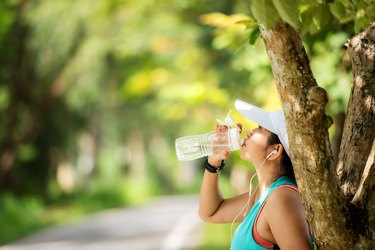
Dry mouth during sports like running can stop you right in your tracks. Feeling parched or like your mouth is full of cotton is common for many runners, especially when exercising in the heat. Although a medical condition or medication could be to blame, the cause is often related to hydration.
Causes of Dry Mouth
Video of the Day
Dry mouth, or xerostomia, is a condition that occurs when your salivary glands don't make enough saliva, according to the Mayo Clinic. When this happens, you may notice dryness or stickiness in your mouth and throat.
Video of the Day
Some of the most common reasons for dry mouth are medical conditions and medication side effects, dehydration and evaporation, says Brett G. Toresdahl, MD, assistant attending physician at the Hospital for Special Surgery and research director for the HSS Primary Care Sports Medicine Service in New York City. Stress or anxiety before a race can also cause dry mouth during running, he says. Here's what you need to know about key causes.
Evaporation
"When running or exercising and breathing with your mouth open, evaporation of the moisture in your mouth can lead to dryness," says Kevin W. Farmer, MD, orthopedic sports medicine surgeon at University of Florida Health in Gainesville. This is incredibly common, and most of us don't even think about it, he says.
Dehydration
Mouth dryness can be a sign of systemic dehydration, Dr. Farmer says. In addition to dry mouth during sports or running, other signs of dehydration include:
- Dark urine
- Lack of sweating
- Muscle cramping
That's why it's imperative to hydrate while exercising.
Medical Conditions
"Some metabolic and autoimmune conditions can lead to persistent dry mouth, as well as certain medications, even without exercising," Dr. Farmer says. If dry mouth persists despite appropriate rehydration and breathing techniques (more on those below), your dry mouth could be a sign of a medical condition or reaction to a medication, and you should follow up with your doctor.
Some of the more common medical conditions related to xerostomia, according to a review in the July-August 2014 issue of Annals of Medical & Health Sciences Research, include:
- Diabetes
- Parkinson's disease
- Thyroid disease
- Rheumatoid arthritis
- Viral infections like HIV and hepatitis C
Solutions for Runner's Mouth
If dry mouth is not related to a medical condition or medication, you'll want to try some dry mouth remedies like examining your hydration status and breathing techniques.
Hydration
Proper hydration depends on the type of training you're doing, Dr. Farmer says. "Before any run, you generally want to drink at least 16 ounces or 2 cups of water approximately 2 hours before you head out for a run," he says. This is also a good time to eat a small snack.
About 15 minutes before your run, he recommends drinking 6 to 8 ounces of water. If you're going to run longer than an hour, make sure you're drinking water at regular intervals during your workout.
Runners who experience dry mouth should first keep track of their fluid intake to ensure that they are properly hydrated throughout the day, Dr. Toresdahl says. Staying hydrated includes any fluids you're getting over the course of a day (including from water-rich foods), as well as in the hours before you hit the pavement.
"While many runners are able to 'drink to thirst,' meaning they can stay adequately hydrated by drinking as needed when they feel thirsty, others may benefit from a consultation with a sports nutritionist or exercise physiologist to get help measuring sweat losses during exercise and create a hydration plan," Dr. Toresdahl says.
Breathing Techniques
In order to avoid evaporation, Dr. Farmer recommends practicing breathing slowly. Take deep breaths and focus on breathing through your nose. "Trying to minimize the amount of mouth breathing you do will decrease the amount of evaporation and dryness," he says.
- Annals of Medical & Health Sciences Research: “Xerostomia Due to Systemic Disease: A Review of 20 Conditions and Mechanisms”
- Brett G. Toresdahl, MD, assistant attending physician, Hospital for Special Surgery; research director, HSS Primary Care Sports Medicine Service, New York, New York
- Kevin W. Farmer, MD, orthopedic sports medicine surgeon, University of Florida Health; advisor, PTPioneer; Gainesville, Florida
- Mayo Clinic: “Dry Mouth”
Is this an emergency? If you are experiencing serious medical symptoms, please see the National Library of Medicine’s list of signs you need emergency medical attention or call 911.